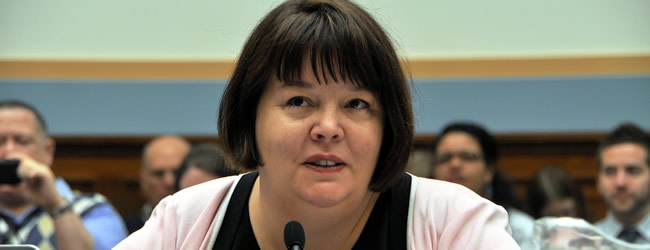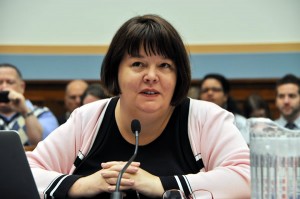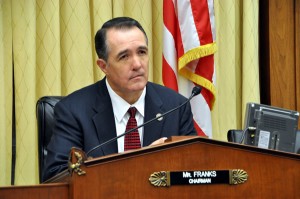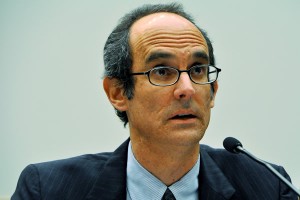Living
Tough questioning for Gallagher at marriage hearing
Democratic lawmakers hammer anti-gay activist

Democratic lawmakers on Friday hammered anti-gay activist Maggie Gallagher during a congressional hearing with questions on why same-sex couples should be excluded from marriage and the extent to which the National Organization for Marriage participated in campaigns to rescind state marriage laws.
In testimony before the House Judiciary subcommittee on the Constitution, Gallagher, NOM’s chair and co-founder, said marriage should restricted to one man and one woman because such unions are the only kind that can produce children and because state voters by referenda have affirmed 31 times that marriage shouldn’t be extended to gay couples.
“Marriage is the union of husband and wife for a reason: these are the only unions that create new life and connect those children in love to their mother and father,” Gallagher said. “This is not necessarily the reason why individuals marry; this is the great reason, the public reason why government gets involved in the first place.”
The hearing, which was titled “Defending Marriage,” took place on the heels of President Obama’s announcement on Feb. 23 that the Defense of Marriage Act is unconstitutional and that his administration would no longer defend the anti-gay law against litigation in court. Following a 3-2 party-line vote in March by the Bipartisan Legal Advisory Council, U.S. House Speaker John Boehner (R-Ohio) directed the House general counsel to take up defense of DOMA in place of the administration.
Gallagher said the need to raise children by married parents of opposite genders affirms the rationale for having in place DOMA, the 1996 law that prohibits recognition of same-sex marriage, and criticized the Justice Department for dropping defense of the law.
“This is the rationale for the national definition of marriage proposed by Congress in passing DOMA: ‘civil society has an interest in maintaining and protecting the institution of heterosexual marriage because it has a deep and abiding interest in encouraging responsible procreation and child-rearing,'” Gallagher said. “If we accept, as DOMA explicitly does, that this is a core public purpose of marriage, then treating same-sex unions as marriage makes little sense.”
Following her opening statement, Gallagher bore the brunt of tough questioning from Democratic lawmakers during the question-and-answer session of the hearing.
Rep. Jerrold Nadler (D-N.Y.), ranking Democrat on the subcommittee, asked Gallagher if the children of Jen and Dawn BarbouRouske, a married same-sex couple from Iowa who were present during the hearing, should have parents who can receive the full protections of marriage or if she considers these children “expendable.”
“I think no children are expendable,” Gallagher replied. “Gay people have families that are not marital families, but they are families. I myself was an unwed mother, so I have firsthand experience with being in a family that’s not a marital family. I don’t think you need to have a message of stigmatization and exclusion to protect to an ideal.”
Nadler, sponsor of DOMA repeal legislation in the House, interrupted Gallagher, saying “the whole point” of DOMA is stigmatization and exclusion, and pressed Gallagher further on why the institution of marriage benefits when same-sex couples are excluded.
“Because including same-sex unions as marriages denies at a public level that marriage is about an important way for getting together mothers and fathers and children,” Gallagher said.
Nadler continued to question Gallagher on NOM’s involvement in 2010 Iowa campaign that successfully ousted three justices from the state Supreme Court who ruled in favor of same-sex marriage. The lawmaker asked Gallagher, who estimated that NOM contributed between $600,000 and $650,000 to the campaign, why she would criticize the Justice Department for allegedly making a political decision while her organization politicized the judicial process.
“The National Organization of Marriage is political advocacy organization, and so I think it’s appropriate for us to be politically involved in ways that Department of Justice is not,” Gallagher replied.
Rep. John Conyers (D-Mich.), a co-sponsor of the DOMA repeal bill, asked Gallagher whether reports were true that her organization contributed $1.9 million to the 2009 campaign in Maine to abrogate the states’s same-sex marriage law. Opponents of same-sex marriage succeeded in nullifying the marriage law in the state before gay couples could marry there.
“I don’t have those figures in front of me, but we were involved in the [effort],” Gallagher said. “But that’s probably on the order [of our contributions].”
NOM has repeatedly come under fire for failing to disclose their donors during the campaign against the Maine marriage law. State courts have ordered the organization to reveal their donors in accordance with the law, but NOM has yet to do so.
Following the hearing, Dan Fotou, eastern regional field director for GetEQUAL, praised Democratic lawmakers for hammering Gallagher with tough questions after her testimony.
“I think it was good to hear the Democrats standing up and challenging Maggie Gallagher’s position,” Fotou said. “Fifty-two percent of Americans think that marriage equality is OK, so I think today was good in terms of putting a face on hate once again, and Maggie does a really great job of that.”
Democratic lawmakers’ criticisms during the hearing weren’t limited to Gallagher. Conyers questioned Rep. Trent Franks (R-Ariz.), chair of the subcommittee, why no witnesses from the Justice Department were present to defend Obama’s decision to drop defense of DOMA.
“What bothers me about this hearing at this subcommittee is that the Department of Justice is not present,” Conyers said. “I was informed that they were not invited. … We have one of the leaders of the country, Ms. Gallagher, who’s raised hundreds of thousands of dollars against judges … but there’s nobody here from the Justice Department.”
In response, Franks said the Justice Department would be invited to come during an upcoming hearing in May before the House Oversight & Government Reform Committee on the DOMA decision. Upon further questioning, Franks maintained the panel was fair because its makeup included witnesses on both sides of the issue.
But Franks’ response apparently didn’t allay the concerns of Conyers, who said he hopes Congress can hear the Justice Department to respond to the criticisms of Gallagher.
“There’s a political tone in this hearing that I want to diminish as much as possible,” Conyers said. “The fact of the matter is this is not in regular order and I do not approve the way that we’re starting out this subcommittee [hearing].”
Despite the general tone in favor of DOMA during the hearing, several panel members known for having anti-gay views — including Rep. Steve King (R-Iowa), who’s railed against same-sex marriage in home state, and Rep. Jim Jordan (R-Ohio), who’s leading the effort to eliminate gay nuptials in D.C. — didn’t make an appearance. Neither the office for King nor Jordan responded to the Washington Blade’s request to comment on why the lawmakers didn’t attend the hearing.
Ian Thompson, who’s gay and legislative representative for the American Civil Liberties Union, said the lack of presence by anti-gay lawmakers was telling that the they were uncomfortable with their positions.
“The thing that was particularly striking to me was the fact that so few DOMA supporters on the committee actually were in attendance,” Thompson said. “So, from my perspective, if the hearing was intended to demonstrate the support of the House of Representatives for DOMA, from the attendance alone, it was a complete and total flop.”
But a few anti-gay Republicans did make an appearance to rebuke the notion of extending marriage rights to gay couples and to criticize the Justice Department for dropping defense of DOMA.
Franks called Obama’s decision to discontinue defense of the anti-gay law an “edict” that “failed to show the caution and respect for Congress and the courts.”
“When the President unilaterally declares a duly enacted law unconstitutional, he cuts Congress and the American people out of the lawmaking process,” Franks said. “Such heavy-handed presidential action undermines the separation of powers and the principle that America is a constitutional republic predicated on the rule of law.”
Franks continued that the arguments in favor of DOMA are “reasonable and right” because marriage between one man and one woman is the best union for raising children.
“Traditional marriage has proven to be the most successful institution in humanity’s history for the propagation and preparation of the next generation,” Franks said. “The traditional family has proven to be the best department of welfare, the best department of education, the best department of crime prevention, and the best department of economic security that there has ever been.”
Rep. Lamar Smith (R-Texas), a lawmaker known for anti-gay views, also made an appearance at the hearing and railed against what he called the government altering the definition of marriage. Smith, chair of the full House Judiciary Committee, offered an opening statement during the hearing even though he’s not a member of the subcommittee.
“If we tamper with the definition of marriage, harmful unintended consequences could follow,” Smith said. “The ability of religious institutions to define marriage for themselves to promote their sincerely held beliefs could be threatened.”
Smith said the will the people is for continued definition of marriage between one man and one woman — noting the 31 successful ballot initiatives that restricted marriage to such unions — and said the U.S. Constitution doesn’t provide protections for same-sex couples seeking to marry.
“No one can seriously believe that the Constitution’s founders intended to create a right to same-sex marriage,” Smith said. “By refusing to defend the Defense of Marriage Act against legal challenges, the administration has allowed the courts to overrule that popular law.”
Franks and Smith’s opening statements were countered by initial remarks from Nadler, who called arguments that Justice Department acted inappropriately by dropping defense of DOMA a “red herring” and said the real question should be whether anyone — either the Obama administration or Congress — should defend the law.
“Far from demeaning, trivializing or destroying the institution of marriage, [gay] couples have embraced this time-honored tradition and the commitment and serious legal duties of marriage,” Nadler said. “Rather than defending DOMA in court, Congress should be working to repeal it.”
Two legal experts on the panel presented opposing views on whether the administration acted within bounds in its decision to discontinue defense of DOMA in court.
Edward Whelan, president of the Ethics & Public Policy Center, said the Justice Department’s decision is in violation of its policy.
“The Obama administration’s decision to abandon defense of DOMA — or more precisely, to abandon its charade of pretending to defend DOMA — departs sharply from the Department of Justice’s long-standing practice,” Whelan said.
Whelan said Obama dropped defense of the anti-gay law to appease a political constituency and to induce the courts to “invent the constitutional right to same-sex marriage.”
“With the exception of laws that intrude on the executive branch’s power, the long-standing practice of the Department of Justice is to vigorously defend the constitutionality of any law where a reasonable may be made,” Whelan said. “This ‘reasonable standard’ is a very low bar. It basically means that the Department of Justice will defend a federal law against constitutional challenge when it can offer non-frivolous grounds in support of the law.”
But Carlos Ball, a gay law professor from Rutgers Law School, testified that Obama acted within his authority because another statute exists saying that the attorney general must inform Congress if the administration decides to no longer defend a law.
“The existence of that statute seems to be a recognition by the Congress of the reality that the executive branch sometimes, in rare cases, can not defend the constitutionality of a law,” Ball said. “The executive branch, as a co-equal branch of government, has the authority and obligation to make independent assessment’s regarding a law’s constitutionality.”
Ball noted precedent for an administration declaring an existing law unconstitutional and dropping defense of the statute in court — the 1990 case of Metro Broadcasting v. FCC. Then-acting U.S. Solicitor General John Roberts, now Chief Justice of the U.S. Supreme Court, argued that a law providing for minority preferences in broadcast licensing was unconstitutional. Despite the position of the Bush administration, the Supreme Court later upheld the law.
Real Estate
Celebrate the power of homeownership this Fourth of July
Owning a home is powerful act of self-determination

This Fourth of July, celebrate more than independence: celebrate the power of LGBTQ+ homeownership. Explore resources, rights, and representation with GayRealEstate.com, the trusted leader in LGBTQ+ real estate for over 30 years.
Home is more than a house: it’s a symbol of freedom
As the fireworks light up the sky this Fourth of July, LGBTQ+ individuals and families across the country are not just celebrating the nation’s independence — they’re celebrating personal milestones of freedom, visibility, and the right to call a place their own.
For many in the LGBTQ+ community, owning a home represents more than stability — it’s a powerful act of self-determination. After generations of discrimination and exclusion from housing opportunities, more LGBTQ+ people are stepping into homeownership with pride and purpose.
Why homeownership matters to the LGBTQ+ community
While progress has been made, LGBTQ+ homebuyers still face unique challenges, including:
- Housing discrimination, even in states with legal protections
- Limited access to LGBTQ+ friendly realtors and resources
- Concerns about safety and acceptance in new neighborhoods
- Lack of representation in the real estate industry
That’s why the Fourth of July is a perfect time to reflect not just on freedom as a concept, but on how that freedom is expressed in the real world — through ownership, safety, and pride in where and how we live.
Finding LGBTQ+ Friendly Neighborhoods
One of the top concerns for LGBTQ+ buyers is whether they’ll feel safe, accepted, and welcome in their new neighborhood. Thanks to evolving attitudes and stronger community support, many cities across the U.S. now offer inclusive, affirming environments.
Some of the best cities for LGBTQ+ home buyers include:
- Wilton Manors, Fla. – A vibrant LGBTQ+ hub with strong community ties
- Palm Springs, Calif. – A longtime favorite for LGBTQ+ homeowners
- Asheville, N.C. – Progressive and artsy, with growing LGBTQ+ visibility
- Portland, Ore. – Inclusive, eco-conscious, and diverse
- Philadelphia, PA – Rich in history and LGBTQ+ community leadership
When you work with an LGBTQ+ friendly realtor, you get insight into more than property values — you get a real perspective on where you’ll feel most at home.
Navigating the real estate process with confidence
Whether you’re a first-time gay homebuyer or preparing to sell your home as an LGBTQ+ couple, it’s essential to understand your rights and options. Here are a few key tips:
1. Work with a trusted LGBTQ+ real estate agent
Representation matters. A gay realtor, lesbian real estate agent, or LGBTQ+ friendly agent understands the unique concerns you may face and advocates for you every step of the way.
Use GayRealEstate.com to connect with LGBTQ+ real estate agents near you. For over 30 years, we’ve helped LGBTQ+ buyers and sellers find their ideal home and a professional who respects their identity.
2. Know your legal protections
While federal law (via the Fair Housing Act and Supreme Court rulings) prohibits housing discrimination based on sexual orientation or gender identity, enforcement can vary by state. Make sure to research:
- State-level housing discrimination laws
- Local LGBTQ+ protections and resources
- What to do if you experience discrimination during a transaction
3. Secure inclusive financing
While most lenders follow fair lending rules, it’s smart to seek out banks or credit unions with LGBTQ+ inclusive policies and a history of non-discriminatory lending practices.
4. Plan for the future as a family
For same-sex couples, especially unmarried partners, it’s vital to review how you’ll hold the title, designate beneficiaries, and plan your estate.
Ask your agent or attorney about:
- Joint tenancy with right of survivorship
- Living trusts
- Powers of attorney and healthcare proxies
Selling a home as an LGBTQ+ homeowner
If you’re listing your home, working with a gay-friendly real estate agent ensures your identity and story are honored — not hidden — in the process.
Highlight:
- Your community connections
- Your home’s role in creating a safe space
- Local LGBTQ+ resources to attract like-minded buyers
Showcasing the full value of your home includes sharing what it meant to live there authentically and safely.
Your home, your freedom
The Fourth of July reminds us that freedom isn’t just an abstract idea — it’s lived every day in the spaces where we find comfort, love, and belonging. For the LGBTQ+ community, the right to own and thrive in a home is part of the larger journey toward full equality.
At GayRealEstate.com, we believe every LGBTQ+ person deserves:
- A safe place to live
- A community that welcomes them
- An advocate in the home buying or selling process
Ready to make a move?
Whether you’re dreaming of your first home, upgrading with your partner, or selling a space that helped shape your identity, GayRealEstate.com is your trusted partner. With our nationwide network of gay realtors, lesbian real estate agents, and LGBTQ+ friendly professionals, we make your journey smooth, respectful, and informed.
Visit GayRealEstate.com to:
- Search LGBTQ+ friendly homes
- Connect with inclusive real estate agents
- Access free guides for buyers and sellers
- Protect your rights and get expert advice
This Fourth of July, celebrate more than independence — celebrate your freedom to live, love, and own with pride.

Did you melt like the Wicked Witch of the West this week?
As summer temperatures rise, keeping your home or apartment cool during a heat wave can become both a comfort issue and a financial challenge. One of the most effective ways to keep a home cool is to prevent heat from entering in the first place. Sunlight streaming through windows can significantly raise indoor temperatures. Consider the following solutions:
• Close blinds or curtains during the hottest parts of the day. Blackout curtains or thermal drapes can reduce heat gain by up to 30%.
• Install reflective window films to block UV rays and reduce solar heat without sacrificing natural light.
• Use outdoor shading solutions such as awnings (yes, the ones you removed because they were “dated”) and shutters to limit direct sunlight.
Fans are a cost-effective way to circulate air and create a wind-chill effect that makes rooms feel cooler.
• Ceiling fans should rotate counterclockwise in the summer to push cool air down.
• Box fans or oscillating fans can be placed near windows to pull in cooler evening air or push hot air out.
• Create a cross-breeze by opening windows on opposite sides of your home and positioning fans to direct airflow through the space.
• For an extra cooling effect, place a bowl of ice or a frozen water bottle in front of a fan to circulate chilled air.
To optimize natural ventilation, open windows early in the morning or late in the evening when outdoor temperatures drop. This allows cooler air to flow in and helps ventilate heat that built up during the day.
Appliances and electronics generate a surprising amount of heat. To reduce indoor temperatures:
• Avoid using the oven or stove during the day; opt for no-cook meals, microwave cooking, or grilling outside.
• Run heat-producing appliances like dishwashers and clothes dryers in the early morning or late evening.
• Unplug electronics when not in use, as even standby power can add heat to your space.
• Switching to energy-efficient LED lightbulbs can also reduce ambient heat compared to incandescent lighting.
If you do use an air conditioner, maximize its effectiveness by:
• Setting it to a reasonable temperature—around 76–78°F when you’re home and higher when you’re away.
• Cleaning or replacing filters regularly to maintain airflow and efficiency.
• Sealing gaps around doors and windows to prevent cool air from escaping. (Didn’t we all have a parent who said, “Close the door. You’re letting all the cool out?”)
• Using a programmable thermostat to optimize cooling schedules and reduce energy use.
If it is not cost-prohibitive, adding insulation in attics and walls can greatly reduce heat transfer. Solar panels that reflect heat can also help, as well as offset the cost of their installation. Adding weatherstripping around doors and windows, sealing cracks, and using door sweeps can make a significant difference in keeping heat out and cool air in.
Natural and eco-conscious methods can also help cool your home.
• Snake plants, ferns, or rubber trees can improve air quality and slightly cool the air through transpiration.
• White or reflective roof paint can reduce roof temperatures significantly.
• Cooling mats or bedding can make sleeping more comfortable without cranking up the A/C.
For renters or those who can’t make permanent modifications, there are still plenty of ways to keep cool.
• Use portable fans and A/C units instead of built-in systems, making sure they are the correct size for your space.
• Removable window film or static cling tinting can reflect heat without violating your lease.
• Install tension rod curtains or temporary blackout panels instead of hardware-mounted window coverings.
• Add draft blockers and weatherstripping tape that can be applied and removed without damage.
• Cover floors with light-colored rugs to reflect heat rather than absorb it.
• If allowed, use temporary adhesive hooks to hang reflective materials or light-filtering fabrics over windows.
Even if your space is warm, you can still take steps to help your body stay cool.
• Wear light, breathable fabrics like cotton or linen.
• Stay hydrated and avoid caffeine or alcohol during peak heat hours.
• Take cool showers or use damp cloths on your neck and wrists to bring your body temperature down.
Keeping your home or apartment cool in the summer doesn’t have to be expensive or energy-intensive. With a few adjustments such as blocking sunlight, optimizing airflow, using fans effectively, and making renter-friendly upgrades, you can create a more comfortable indoor environment while keeping energy bills in check.
Valerie M. Blake is a licensed Associate Broker in D.C., Maryland, and Virginia with RLAH @properties. Call or text her at 202-246-8602, email her at DCHomeQuest.com, or follow her on Facebook at TheRealst8ofAffairs.
Real Estate
The world’s on fire and D.C. is on sale (sort of)
Prices are up, but then again, nothing makes sense anymore

ICE is disappearing people, revered government agencies are shuttering, and who knows if we’ll be in World War III next week? But can you believe prices in D.C. are actually still up 6.3% since last year? It doesn’t make sense, and perhaps that does make sense, because nothing seems to make any sense any more.
That said, there are some parts of our market that are truly suffering. The interest rates, which have been up, up, up for about four years now, are the ongoing rain on our market’s military parade. Combine that with 75,000 federal employees taking a buyout nationwide, and DOGE cuts eliminating around 40,000 federal jobs in the District (per estimates by the D.C. CFO), not to mention thousands of other job losses in non-governmental organizations due to funding and program cuts, and you’ve got a case of uncertainty, and downright unaffordability in the pool of otherwise would-be buyers.
This has had a marked impact on properties that starter-home buyers and low- to mid-level employees would otherwise buy, most notably condominium and cooperative apartment units. These properties have already slowed in our market thanks to the profound impact that higher interest rates have had on their monthly carrying costs—pair that with job insecurity, and a lot of condos are proving to be very difficult to sell indeed.
So how is the average sale price up in our market?
The increase is almost entirely due to the resounding strength of the single-family home market, especially in upper Northwest D.C., where it is still quite common to see bidding wars, even on properties pushing past the $3M mark. It seems that buyers in that echelon are less impacted by a few percentage points in the interest rate, and less concerned about their job security. Notably, those buyers are often married with children and have an absolute need for more space, must stay in the area due to one spouse’s job, or the kid’s friend group, regardless of whether the cost of owning is thousands of dollars more per month than it would have been in 2020 or 2021. The continued appreciation in these neighborhoods defies imagination.
So, what to do if you are not one of those lucky enough to be shopping for a $3M home? The short answer: wait. If you want more space, rent your current place out and learn the joys of being a landlord while someone else pays your mortgage. Need the equity from your current home to buy your next place? Get a home equity line of credit, or loan, and pull the equity out of your current place to buy the next one. Or—and I have never recommended this before in 21 years of being a Realtor—rent for a few years. Sure, I’d love to list and sell your condo so you can climb the real estate ladder, but it might just be a waste of time, money or both if you could just ride out this storm and sell in a DOGE-less future.
All this said, there are some condos that seem to be immune from this recent negative news. Anecdotally, it feels like it’s the truly special ones that do just fine no matter the market. Our recent listing in Capitol Hill had a view from every one of its 15 windows of the Supreme Court. Sold in five days with six offers. Another condo was on the top two floors of a townhouse and had the coolest black wood floors that gleamed like a grand piano. Sold in four days at full price.
So, all is not for naught if you have a condo or home in an area that people want to be in, with nice space, light, amenities and a certain je ne sais quois. And, as long as we have a democracy in a few years, my experience says our market will be back, stronger than ever, really soon.
David Bediz is a Realtor and mortgage loan broker for the Bediz Group LLC and Home Starts Here, LLC. Reach him at [email protected].
-

 U.S. Supreme Court3 days ago
U.S. Supreme Court3 days agoSupreme Court to consider bans on trans athletes in school sports
-

 Out & About3 days ago
Out & About3 days agoCelebrate the Fourth of July the gay way!
-

 Virginia3 days ago
Virginia3 days agoVa. court allows conversion therapy despite law banning it
-

 Federal Government5 days ago
Federal Government5 days agoUPenn erases Lia Thomas’s records as part of settlement with White House















